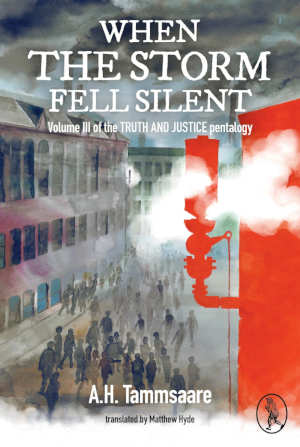When the Storm Fell Silent
- Auteur: A.H. Tammsaare (Estland)
- Soort boek: Estische roman
- Origineel: Tõde ja õigus III
- Engelse vertaling: Matthew Hyde
- Uitgever: Vagabond Voices
- Verschijnt: 6 oktober 2025
- Omvang: 308 pagina’s
- Uitgave: paperback
- Prijs: £ 14.95
- Boek bestellen bij: Amazon
A.H. Tammsaare When the Storm Fell Silent review en recensie
Als er in de media een boekbespreking, recensie of review verschijnt van When the Storm Fell Silent, de roman van de Estische schrijver A.H. Tammsaare, dan besteden we er op deze pagina aandacht aan.
Flaptekst van de roman van de Estische schrijver A.H. Tammsaare
When the Storm Fell Silent is an ironic, tragic and contradictory work which reflects the author’s ambivalent attitude to the 1905 Revolution in Tsarist Russia, which Estonia was then a part of. He sympathised with the policies but disagreed with the random violence. This however does not do justice to the complexity of this great work which comprehends the difficult truth that the majority’s altruism, humanity and desire to improve other people’s lives can end in so much suffering without any durable gains. What appears simple becomes entangled in a web of mendacity, double-speak and false promises.
Indrek, the central character, clearly represents Tammsaare’s own convictions, but not exactly. The author can approach any subject and stun the reader with his novel interpretations, and also gives the reader the opportunity to read his words and infer varied understandings and appreciations. Every actor in a revolution is represented here: from left to right and back again, every striking worker, every shopkeeper, every landowner, every policeman, every spy, every worker’s wife, every outsider and every starry-eyed teenager. Few people are who they first seem to be, and the shifting trends of the crowd are followed and carefully examined – a force of nature that ultimately is spent.
When the Storm Fell Silent is Volume III in the Truth and Justice pentalogy, a monumental work which has been translated into many European languages, but only now being published in English for the first time by Vagabond Voices. The first two volumes, Vargamäe and Indrek deal with the personal and the familial and this third volume with the public and societal, but always both elements are present: one in foreground and one in the background, because Tammsaare is as much a holistic writer and he is an extraordinarily imaginative one.
A.H. Tammsaare was born on 30 January 1878 as Anton Hansen in Vetepere, Estonia. into a poor farming family in a small Estonian village. Due in part perhaps to his family’s unusual intellectual curiosity, Tammsaare raised money for an education and studied law at the University of Tartu until he was hospitalised with tuberculosis in 1911. After a year in hospital he spent six years recovering on his brother’s farm. When Estonia became independent, he moved to Tallinn in 1920 and embarked on the most productive period of his life. His greatest influences were Russian realists such as Dostoyevsky, Tolstoy and Gogol, but his work also shows the influence of Oscar Wilde, Knut Hamsun and André Gide. He occupies a central role in the development of the Estonian novel and is a figure of European significance. The firHe died on 1 March 1940 at the age of 62 in Tallinn, in the midst of the Republic’s most difficult times.
